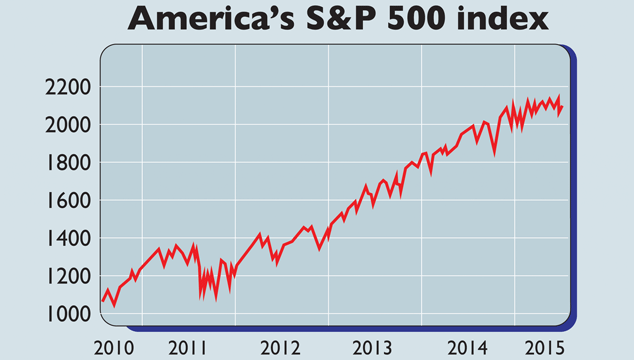
“For all the hand-wringing” about turmoil in Greece and China, US stocks are doing well, says John Kimelman in Barron’s. The S&P 500, the world’s leading stockmarket, is only just below its all-time high set in May. Last week’s uptick in China calmed investors’ nerves, and now they are hoping for a solid earnings season to give stocks a further boost. But they may be out of luck.
S&P 500 companies’ second-quarter earnings per share are currently expected to fall by 4.5% year-on-year. That would mark the first decline since 2012. It would be due to energy firms, which account for almost 10% of the market and have been buffeted by the steep fall in the oil price over the past year. Nor does it help matters that the dollar has risen over the past year: S&P 500 firms make around half their sales overseas. Strip out the oil sector, and earnings growth of 2.2% is expected to be the result.
Still, estimates may have “come down to the point that Corporate America can probably clear the hurdle”, says Johanna Bennett, also in Barron’s. Companies are good at managing expectations downwards, and then surprising the markets by eclipsing their lowered benchmarks. That cheers investors and helps buoy the market. Before the first quarter, for example, analysts had anticipated a 4.9% annual drop in profits, but in the end they actually grew by 0.8%.
Yet while profit growth may be better than expected, “it’s still going to be a relatively low number”, says Daniel Morris of financial services group TIAA-CREF. And it’s hard to see it being enough to bolster equities, especially when the market is so expensive. The market is on a price-earnings (p/e) ratio of 18 and a cyclically adjusted p/e of 27, miles above the long-term average.
One important reason earnings per share have looked so solid in recent years is record share buybacks. But this tailwind is set to fade as interest rates rise because so many companies have borrowed money to buy their stock back.
Stocks tend to wobble as dearer money approaches, so the first interest-rate increase in almost ten years – due in the autumn – is likely to unsettle investors in the next few months. Given all this, it’s no wonder more and more people reckon US stocks could be due a correction. As Bloomberg points out, short sales on the New York Stock Exchange have reached their highest level since the financial crisis.